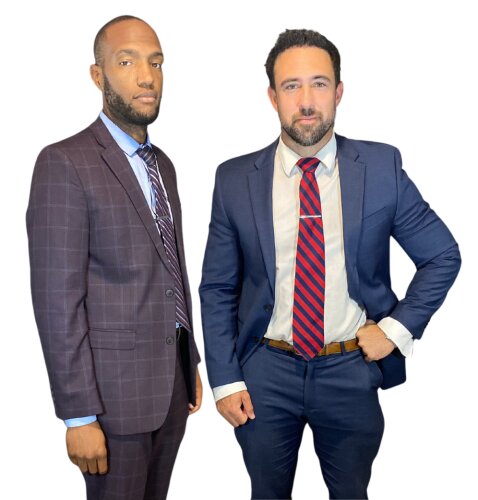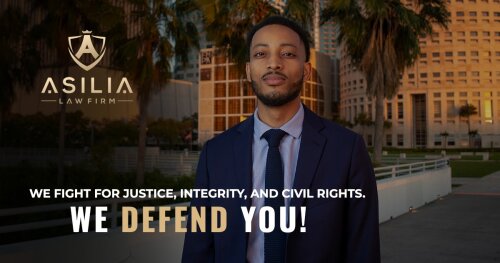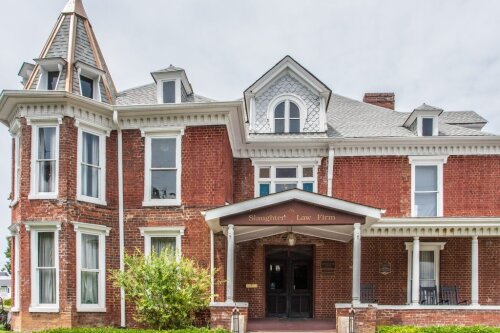Best Juvenile Law Lawyers in Florida
Share your needs with us, get contacted by law firms.
Free. Takes 2 min.
Or refine your search by selecting a city:
List of the best lawyers in Florida, United States
About Juvenile Law in Florida, United States
Juvenile Law in Florida is a specialized area of law that addresses the rights, protections, and responsibilities of minors who are either accused of committing offenses or are in need of care and protection. The juvenile justice system is distinct from the adult system, focusing more on rehabilitation than punishment. Juvenile Law encompasses delinquency proceedings, dependency cases, and status offenses involving minors under the age of 18. While the court’s main goal is to safeguard the welfare of the child, it also seeks to ensure public safety and accountability for unlawful behavior.
Why You May Need a Lawyer
There are several situations in which individuals and families may require legal assistance in Juvenile Law:
- Your child has been arrested or charged with a crime, and you need guidance through the juvenile court process.
- Your family is facing a dependency case initiated by the Florida Department of Children and Families (DCF) due to alleged abuse or neglect.
- You are being investigated for potential neglect or abuse as a parent or guardian.
- You or your child need help navigating school discipline matters that might lead to criminal charges.
- Your child is facing probation violations or has previous juvenile adjudications that could affect their future.
- You are involved in truancy or other status offense allegations (acts only illegal because of age, such as running away).
Juvenile Law can be complex, and the consequences can greatly impact both the minor’s and the family’s future. Consulting an attorney ensures your rights and your child’s rights are protected throughout the legal process.
Local Laws Overview
Florida’s Juvenile justice system is governed primarily by Chapter 985 of the Florida Statutes. Here are some key aspects of local Juvenile Law:
- The legal age for juveniles is generally under 18 years.
- Juvenile courts handle three main types of cases: delinquency (criminal behavior), dependency (child welfare cases), and status offenses.
- Juveniles are provided certain rights, including the right to counsel, the right to remain silent, and protections against self-incrimination.
- Florida permits direct file, meaning certain juveniles can be prosecuted as adults depending on their age and the severity of the alleged offense.
- The court emphasizes rehabilitation and may order counseling, education, community service, and probation in lieu of detention.
- Records stemming from juvenile proceedings are typically confidential, but some may become public under specific circumstances (such as direct file cases).
- Juvenile detention is usually reserved for those considered a risk to themselves or the community, with strict time limits set for detainment before a court hearing.
- Parents or guardians are often required to participate in proceedings and may be ordered to contribute to restitution or other court orders.
Frequently Asked Questions
What is considered a juvenile in Florida law?
In Florida, a juvenile is any person under the age of 18 who is alleged to have committed an offense or requires services or intervention from the juvenile court.
Can a juvenile be tried as an adult in Florida?
Yes, under certain circumstances, Florida law allows juveniles as young as 14 to be transferred to adult court through what is called "direct file," usually for serious or violent offenses.
How are juvenile records treated in Florida?
Juvenile records are generally confidential and not publicly accessible. However, they may be disclosed in certain situations, such as if the juvenile is charged as an adult or for particular types of crimes.
What kinds of cases does the juvenile court hear?
Juvenile courts in Florida handle delinquency cases (crimes committed by minors), dependency cases (allegations of abuse, neglect, or abandonment), and status offenses (acts like truancy or running away).
What rights does a juvenile have when arrested?
Juveniles have many of the same rights as adults, including the right to remain silent, the right to legal counsel, and the right against self-incrimination. They must also be advised of these rights.
What is the focus of the juvenile court system?
The juvenile justice system in Florida emphasizes rehabilitation and treatment, rather than punishment, while holding minors accountable for their actions.
Are parents held responsible for their child’s actions in juvenile court?
Parents or legal guardians may be ordered to participate in court-ordered programs and can be held financially responsible through restitution or other requirements set by the court.
What happens during a juvenile detention hearing?
A detention hearing determines whether a juvenile should be held in secure detention pending further court action or released to a parent or guardian. These hearings must occur within a short timeframe (usually 24 hours of arrest).
Can a juvenile get legal representation in court?
Yes, juveniles have the right to an attorney. If they cannot afford one, the court will appoint a public defender or court-appointed lawyer to represent them.
What are possible outcomes in juvenile delinquency cases?
Outcomes can include dismissal, diversion programs, probation, community service, counseling, or more serious consequences like placement in a juvenile detention facility. The goal is usually to provide opportunities for rehabilitation.
Additional Resources
If you need more information or assistance, the following organizations offer support and guidance regarding Juvenile Law in Florida:
- The Florida Department of Juvenile Justice (DJJ) - Provides oversight and information about the juvenile justice process.
- The Florida Guardian ad Litem Program - Represents the interests of children in dependency cases.
- Legal Aid Societies in your local area - Offer free or low-cost legal advice and representation for eligible families.
- Your local Public Defender’s Office - Represents indigent juveniles in delinquency proceedings.
- The Florida Bar Lawyer Referral Service - Can connect families with attorneys experienced in Juvenile Law.
- County Clerk of Court Juvenile Division - Source of information for case-specific procedures and documentation.
Next Steps
If you or your child are facing a Juvenile Law matter in Florida, it is important to take prompt action:
- Gather all documentation and information related to your situation, such as notices, arrest records, or DCF communications.
- Contact a qualified Juvenile Law attorney to discuss your case and understand your rights and obligations.
- Consult with local legal aid organizations if you need free or reduced-cost legal help.
- Attend all required court dates and meetings, and follow the advice of your legal counsel throughout the process.
- Stay informed about your case and keep open communication with your child, school officials, and any caseworkers involved.
Time can be a critical factor in Juvenile Court matters. Reaching out to an experienced attorney ensures you receive timely and effective representation to protect your family’s interests.
Lawzana helps you find the best lawyers and law firms in Florida through a curated and pre-screened list of qualified legal professionals. Our platform offers rankings and detailed profiles of attorneys and law firms, allowing you to compare based on practice areas, including Juvenile Law, experience, and client feedback.
Each profile includes a description of the firm's areas of practice, client reviews, team members and partners, year of establishment, spoken languages, office locations, contact information, social media presence, and any published articles or resources. Most firms on our platform speak English and are experienced in both local and international legal matters.
Get a quote from top-rated law firms in Florida, United States — quickly, securely, and without unnecessary hassle.
Disclaimer:
The information provided on this page is for general informational purposes only and does not constitute legal advice. While we strive to ensure the accuracy and relevance of the content, legal information may change over time, and interpretations of the law can vary. You should always consult with a qualified legal professional for advice specific to your situation.
We disclaim all liability for actions taken or not taken based on the content of this page. If you believe any information is incorrect or outdated, please contact us, and we will review and update it where appropriate.
Browse juvenile law law firms by city in Florida
Refine your search by selecting a city.













